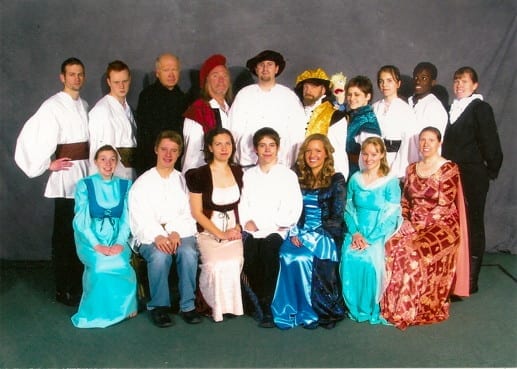LINDON — Benedick and Beatrice absolutely can’t abide one another. They hardly meet, but there is a “skirmish of wit” between them. So what happens when their friends and relatives conspire to make the pair fall madly in love with one another? Much Ado About Nothing is one of Shakespeare’s most popular plays, so much so that one can be assured that if they have never seen it, a production will most likely be in play within the year somewhere in their vicinity. The play is a funny one, and I would recommend seeing it at some point in your life. However, if you are new to the show, I would have to recommend that you seek your first taste of it elsewhere. Though I have seen (and appeared in) the play countless times, I was still excited to see the production currently underway at the Valley Center Playhouse. However, though the play had some good points, it was something of a disappointment.
The main flaw of this play came in the casting. I believe that the play was somewhat miscast, with more able actors in less significant roles, and lead players who failed to carry the show. One example of a more capable side character came in the part of Dogberry, played by Amanda Von Der Lohe, whose talent and stage presence shone far and above the rest of the cast. I didn’t like all the choices that the director, Tawni Branton, made for Dogberry (such as having Verges played by a puppet on Lohe’s hand, or editing a certain line wherein Dogberry continuously refers to himself as an “ass,” which is one of the funniest in the play). Nevertheless, Von Der Lohe carried her role well, and she was welcome relief from the show’s otherwise tedious tempo. She made excellent use of the language, deftly handling Dogberry’s famous malapropisms with vibrant energy and excellent comedic timing. Another bright spot came in the form of Jude Hall as the villainous Don John, half-brother to the prince Don Pedro, who seems bound and determined to ruin everybody else’s happiness simply because he can. Hall slinked and skulked around the stage with crackling charisma. His whole body was engaged in his performance, and he, along with Von Der Lohe, stole the show.
Other notable performances were Ellen Weatherford as Hero and Fiona Branton as Watch #1. I was pleased with the way Weatherford played Hero, an ingénue character which I usually find quite uninteresting. But Weatherford was lively and committed to her character, particularly in the wedding scene, wherein Weatherford even managed tears, though her co-stars struggled to perform the more dramatic scene.
In the lead roles were Mark Neilsen as Benedick and Naomi Branton as Beatrice. Unfortunately, I was underwhelmed by Neilsen’s performance, though he did have one or two good moments. Branton’s Beatrice seemed awkwardly put on, and I found nothing natural or engaging about her performance. Many actors seemed to struggle with the lines, and quite a few were dropped. This was surprising, especially given the fact that there was a script onstage throughout the entire play in the hands on Don Pedro (played by Jordon Toomey) who did not have a single line memorized. Possibly he was a last minute addition to the cast, which occasionally happens at many theaters in the state, but I don’t know for sure.
The stage was set in the round, and it was minimalistic, which I appreciated. Costumes, by Tawni Branton, Paula Bass, Joyce Gunther, and Kevin Tucker were also simplistic, which I liked, though the presence of modern footwear was distracting. Lights and sound by Stephen Johnson were adequate, though there was a certain song playing for set changes that was repeated after every scene, becoming almost comical in its repetition. It broke the mood after dramatic scenes, being, as it was, very jaunty, and it detracted somewhat from the feel of the show. Finally, there did not seem to be a great deal of direction apparent in the show, save for some uncomfortable blocking choices. I felt that the show could have benefited from stronger direction.
Perhaps the best part of this play was the words of the Bard. Shakespeare’s words sparkle under any circumstances, and sometimes a well-written joke can tell itself. I did enjoy some moments in the show that highlighted his ability to turn a phrase, and laughed along with the audience at the witty wordplay. This production of Much Ado About Nothing does have its moments of strength, but I would hesitate to recommend it to friends and family.
[box type=”shadow”]Much Ado About Nothing plays at Valley Center Playhouse (780 North 200 East, Lindon) Fridays, Saturdays, and Mondays at 7:30 PM. Tickets are $2-7. For more information, visit www.valleycenterplayhouse.com.[/box]

